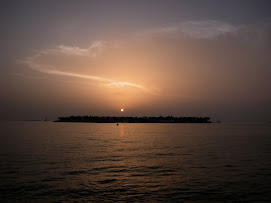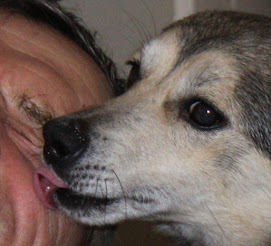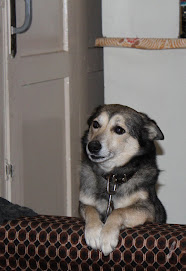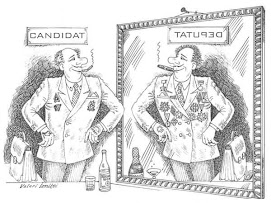By Rodica Socolov
The recent spasm of post-election violence in Moldova holds both peril and promise.
The beating and disappearance of people for their political views mean the European Union risks finding another Belarus-style dictatorship on its borders.
After several days of surfing the Internet for information about this horrible event and everything that has happened in Chisinau since then it is still hard to believe that it concerns my home country.
Moldovans usually are too cautious when decisive action needs to be taken. Somebody might say that the people have had enough disappointments during the 8 years the communists have been in power. But this is a tolerant nation. Many times when the truth should be spoken, instead there is silence.
The majority of the population got used to hiding their thoughts and feelings during the Soviet times, when a simple word at the wrong time could mean isolation or punishment.
Who wants to get in trouble? From many circumstances people learned not to talk about things that could get them in hot water. “Don’t bother me and I won’t bother you” – I have heard this expression so many times.
The 7th of April will remain an exception in the history of Moldova and years from now, many minds will probably still be trying to solve the puzzle - “Who did it and why?”. But in the current situation there is little hope that this case will be investigated properly.
In spite the efforts to uncover the truth, fear on the part of the leader of the ruling party led to chaotic action and poor decisions. Is this the party that won the majority of votes in the parliamentary election of 5 April?
There are many messages to be drawn from the astonishing situation. First of all, it proves that the Communist Party of the Republic of Moldova cannot deal with situations like this. Its methods are old and filthy, violent and offensive.
In just several days its members showed neither respect nor understanding for citizens and it seems we are not far from the establishment of a police state or dictatorship.
While the whole society is horrified by how the two main administrative buildings in the country could be vandalised so easily, the ruling party is proceeding by bullying, arresting and intimidating anyone that has or could express an opinion.
Moldovan President Vladimir Voronin immediately accused almost everyone - opposition parties, teachers, journalists, businessmen and members of human rights organisations – of trying to stage a political coup.
Another rash presidential decision led to a complete break in diplomatic relations between Moldova and Romania, which he also blamed for attempting a secret coup.
Voronin’s attitude toward young people was even more severe. Many of them were kidnapped from streets and schools and taken violently to be interrogated about everything they had done and seen in the main square of Moldovan capital, where most of them gathered for a peaceful protest against what they saw as unfair elections.
Young people in Moldova are more open to change and less afraid to tell the truth then their parents. But what happened on 7 April in Chisinau doesn’t have any logic.
What kind of anger could motivate someone to carry on such a delinquent and antisocial plan? Two main buildings in the country the Parliament and the Presidential Palace were assaulted and almost everything inside was damaged by force or by fire.
Many people are terrified how much money will be needed to cover the cost of the repairs. This will be a huge burden for Moldovans, as the country already has $4 billion in debts. Where will another $27 million or so, according to the ruling party’s estimate, be found to cover the cost?
Both magnificent buildings were designed and built in the Soviet era (1970s) for the comfort of the communist administration. Since Moldova became an independent country they served other parties in power too, playing to some extent the role of the symbols of the Moldovan state.
Money is not the only thing that matters. Valuable state documents, and private data, as well, were trampled or destroyed by fire. This was not only a barbarian act against buildings and people who were almost ready to enter their offices, but also against many Moldovan citizens, who invested politicians with power in order to be protect their interests.
If such an incident had occurred in a different country, people would question the governing party’s ability to ensure their security. But in Moldova, the people were questioned first.
Unfair situation, isn’t it?
Hard to imagine, but in the parliamentary elections of 5 April 2009 the communists won the majority of votes. Nobody would have expected such an easy victory.
There was just a small possibility this would happen, based on people’s recent attitudes as reflected in an opinion poll. The majority of the population got used to the communists, and no longer considered them as bad as the communists of the 1990s, against whom they rebelled.
The Communist Party of the Republic of Moldova first came to power in 2001 with a vote for change. During 8 years they have proved to be much more liberal then their predecessors, but even so, they never risked giving up the lucky communist niche.
What could work better for them than holding onto communist ideas? If they changed their position on the political spectrum, they would become just another party, indistinguishable from many others.
Although it remains in the communist niche, the ruling party has gained some trust by promising to bring the country into European family and ensure people’s fundamental rights.
Was this really enough to win the majority of seats in the Parliament for the second time?
People’s lives have not improved so much since 2001. Some things have progressed, but not for everybody - and not particularly because of the decisions of the communist party.
New technology brought some comfort to people’s lives, but that happened all over the world.
A couple of years ago, Freedom House declared the press in Moldova “not free”. Its status was upgraded to “partially free” at the end of 2008, just before the electoral year.
In spite of restrictions on the press, unlimited access to the Internet started to change people’s lives. Mobile and online communication made a huge difference for many, especially for those who re-established communication after many years with family members who earn money abroad.
Attempts to limit people’s Internet access began when the first signs emerged of possible fraud in the parliamentary election of 5 April, and the information spread more quickly than ever before because of new ways of communication.
After the unexpected developments in Chisinau, the head of the state, whose term should have expired on 8 April, allowed opposition parties to check the electoral registers - but only for 4 days, a very short period, considering the complicated legal procedures for accessing the registers.
In the meantime, Voronin revised his position and asked the Constitutional Court to permit all votes to be recounted. In his opinion, this could create the climate of stability necessary for new legislative activity.
So far, the reaction of Moldovan society has been massive disappointment. Police officers are resigning. Journalists are seeking asylum in other countries. Parents are searching desperately for their children.
The terror continues. Nobody knows where the communist party’s unsuccessful management of the critical post-electoral situation will lead. But national experts fear that it could transform Moldova into a police state or dictatorship.
It is becoming obvious that Moldova needs a new election. A recount is not enough. The court is in the hands of the communists. The party must be punished for its actions, and the people do not deserve a party that neglected them, tortured them and trampled their rights.
But, as the same national experts say, Moldova won’t be able to solve the crisis without the support of a large number of political actors, civil society and international organizations.
Isn’t it enough for your people, Mr President?
12 Apr 2009
Subscribe to:
Posts (Atom)
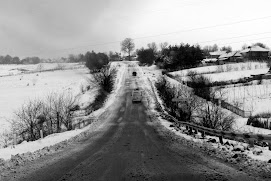
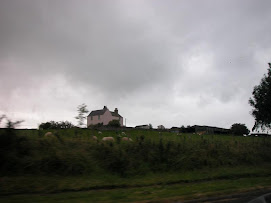.jpg)



